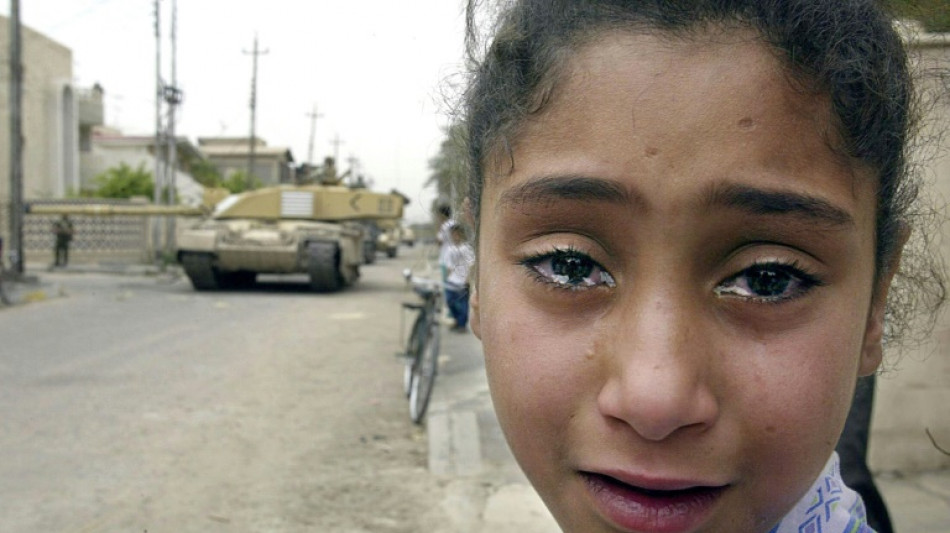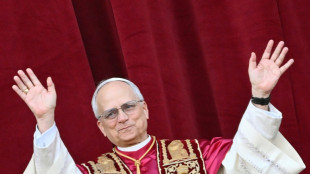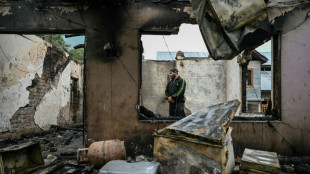
-
 Slot says all at Liverpool sad to see Alexander-Arnold go
Slot says all at Liverpool sad to see Alexander-Arnold go
-
Leo XIV celebrates first mass as pope in Sistine Chapel

-
 India says repulsed fresh Pakistan attacks as death toll climbs
India says repulsed fresh Pakistan attacks as death toll climbs
-
Japan's Panasonic targets 10,000 job cuts worldwide

-
 Putin evokes WWII victory to rally Russia behind Ukraine offensive
Putin evokes WWII victory to rally Russia behind Ukraine offensive
-
China exports beat forecasts ahead of US tariff talks

-
 Leo XIV, the 'Latin Yankee', to celebrate first mass as pope
Leo XIV, the 'Latin Yankee', to celebrate first mass as pope
-
Most stocks lifted by hopes for US-China talks after UK deal

-
 IPL suspended indefinitely over India-Pakistan conflict: reports
IPL suspended indefinitely over India-Pakistan conflict: reports
-
German lender Commerzbank's profits jump as it fends off UniCredit

-
 Rare bone-eroding disease ruining lives in Kenya's poorest county
Rare bone-eroding disease ruining lives in Kenya's poorest county
-
India says repulsed fresh Pakistan attacks as de-escalation efforts grow

-
 Zhao's historic snooker title sparks talk of China world domination
Zhao's historic snooker title sparks talk of China world domination
-
'High expectations': EU looks to Merz for boost in tough times

-
 Poisoned guests rarely invited before deadly mushroom lunch, Australia trial hears
Poisoned guests rarely invited before deadly mushroom lunch, Australia trial hears
-
China sales to US slump even as exports beat forecasts

-
 Indian cricket to make 'final decision' on IPL over Pakistan conflict
Indian cricket to make 'final decision' on IPL over Pakistan conflict
-
Dethroned Bundesliga champions Leverkusen face uncertain future

-
 China can play hardball at looming trade talks with US: analysts
China can play hardball at looming trade talks with US: analysts
-
French monuments in trouble while PSG prepare for Champions League final

-
 Newcastle face Chelsea in top five showdown, Alexander-Arnold in spotlight
Newcastle face Chelsea in top five showdown, Alexander-Arnold in spotlight
-
Flick's Barca must show 'hunger' in crunch Liga Clasico

-
 Clasico the last chance saloon for Ancelotti's Real Madrid
Clasico the last chance saloon for Ancelotti's Real Madrid
-
Timberwolves overpower Warriors to level series

-
 Chinese fabric exporters anxious for US trade patch-up
Chinese fabric exporters anxious for US trade patch-up
-
Putin gears up to host world leaders at lavish army parade

-
 Nearing 100, Malaysian ex-PM Mahathir blasts 'old world' Trump
Nearing 100, Malaysian ex-PM Mahathir blasts 'old world' Trump
-
Leo XIV, first US pope, to celebrate first mass as pontiff

-
 Asian stocks lifted by hopes for US-China talks after UK deal
Asian stocks lifted by hopes for US-China talks after UK deal
-
Former head of crypto platform Celsius sentenced 12 years

-
 Ex-model testifies in NY court that Weinstein assaulted her at 16
Ex-model testifies in NY court that Weinstein assaulted her at 16
-
Nestlé and OMP Showcase Approach to Future-Ready Supply Chain at Gartner Supply Chain Symposium/Xpo in Barcelona

-
 Genflow Biosciences PLC Announces Share Subscription, Director's Dealing and Update
Genflow Biosciences PLC Announces Share Subscription, Director's Dealing and Update
-
Argo Blockchain PLC Announces 2024 Annual Results and Restoration of Listing

-
 'Great honor': world leaders welcome first US pope
'Great honor': world leaders welcome first US pope
-
Pacquiao to un-retire and fight Barrios for welterweight title: report

-
 Trump unveils UK trade deal, first since tariff blitz
Trump unveils UK trade deal, first since tariff blitz
-
Man Utd one step away from Europa League glory despite horror season

-
 Jeeno shines on greens to grab LPGA lead at Liberty National
Jeeno shines on greens to grab LPGA lead at Liberty National
-
Mitchell fires PGA career-low 61 to grab Truist lead

-
 AI tool uses selfies to predict biological age and cancer survival
AI tool uses selfies to predict biological age and cancer survival
-
Extremely online new pope unafraid to talk politics

-
 Postecoglou hits back as Spurs reach Europa League final
Postecoglou hits back as Spurs reach Europa League final
-
Chelsea ease into Conference League final against Betis

-
 Pope Leo XIV: Soft-spoken American spent decades amid poor in Peru
Pope Leo XIV: Soft-spoken American spent decades amid poor in Peru
-
First US pope shared articles critical of Trump, Vance

-
 'Inexcusable' - NBA champs Boston in trouble after letting big leads slip
'Inexcusable' - NBA champs Boston in trouble after letting big leads slip
-
US automakers blast Trump's UK trade deal

-
 Stocks mostly rise as US-UK unveil trade deal
Stocks mostly rise as US-UK unveil trade deal
-
Trump presses Russia for unconditional 30-day Ukraine ceasefire


What's at stake in Britain's Iraq war inquiry
The Chilcot inquiry report on Britain's role in the Iraq war could still have significant fallout when it is published Wednesday -- even though it is seven years after the probe was launched.
Here are some of the likely ramifications:
- Tony Blair -
The former Labour prime minister took Britain into the US-led invasion, making the case to the public and parliamentarians, many of whom were strongly opposed.
The justification was that Iraqi leader Saddam Hussein had weapons of mass destruction (WMD), but these were never found and the intelligence was later severely criticised.
Blair's close relationship with US president George W. Bush led to accusations that he privately pledged British support for the war well before parliament agreed to it.
During the war, the International Criminal Court was petitioned to investigate alleged war crimes by Blair and his ministers relating to Iraqi civilian casualties.
The court has said it would look at the Chilcot report but noted it cannot rule on the legality of the war and could only act if British courts first refused to take up the case.
A group of MPs led by former Scottish first minister Alex Salmond is also investigating possible legal action and whether Blair could be retrospectively impeached.
In a CNN interview last year, Blair said: "I apologise for the fact that the intelligence we received was wrong."
He added: "I also apologise for some of the mistakes in planning and, certainly, our mistake in our understanding of what would happen once you removed the regime.
"But I find it hard to apologise for removing Saddam."
- Relatives of soldiers killed -
Relatives of the 179 British soldiers killed in Iraq had pressed for the inquiry, amid criticism of the motivation, planning and management of the conflict, and accusations that the troops were not properly equipped.
Lawyers will be scouring the report for any potential basis for legal action against Blair, other officials or the Ministry of Defence, likely based on misconduct in office or neglect of duty.
However, some relatives are reportedly boycotting the launch, already convinced it will be a whitewash.
- Military and intelligence chiefs -
The inquiry is expected to deal extensively with the failures in the military operation, from the planning of the war to the occupation, during which Iraq descended into sectarian violence from which it has yet to emerge.
"There is already general recognition that there were systemic failures in the operation after we entered Basra and the south," said Malcolm Chalmers, deputy director general of the Royal United Services Institute think tank.
He said British forces underestimated the strength of the local opposition and the determination of regional powers -- notably Iran -- to undermine the US and Britain.
Previous reports have criticised the failures in intelligence that led to the conclusion that Iraq had WMD, and how that was used by politicians -- but Chilcot could add to this.
Britain's Chief of Defence Staff Nick Houghton, who was a senior British military commander in the Iraq war, could be singled out for criticism, the Guardian newspaper reported earlier this year.
- Labour party, and parliament -
Opposition Labour leader Jeremy Corbyn, who is facing a rebellion by more than 80 percent of his MPs, is expected to use the Chilcot report to bolster his position.
The veteran socialist was strongly opposed to the war in Iraq and maintains it was illegal, while many of those trying to unseat him had supported it.
But one of his supporters, Paul Flynn, said that "parliament is on trial" over the war.
"It was not just one man; it was hundreds of MPs, three select committees of this House, the military and the press who were in favour of joining a war in pursuit of non-existent weapons of mass destruction," he said.
- US-British relations -
The report will reportedly include 29 letters sent by Blair to Bush in the run-up to the invasion, which will only be lightly redacted.
There will also be some form of record of conversations between them, as well as between their successors Gordon Brown and Barack Obama.
Diplomatic wrangling over what could be published was one of the reasons why the Chilcot report took so long.
Y.Kobayashi--AMWN